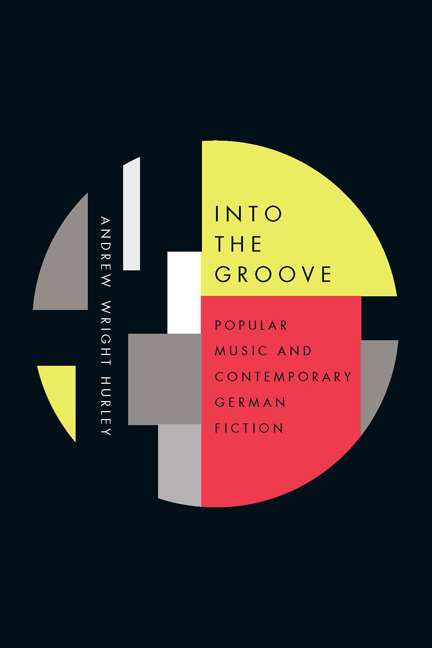Book contents
- Frontmatter
- Dedication
- Contents
- Acknowledgments
- Introduction
- 1 Preludes and Returns: Popular Music, the ʿ68 Generation, and the Literarization of the Jukebox
- 2 Enter the Double Agent: The German Popular Musician as Novelist
- 3 Techno-Lit: Electronica and Its Impacts on Fiction
- 4 Analogue is Better: Rock- and Pop-centric Literature
- 5 After the GDR's “Musical Niche Society”? Popular Music in the Literature of Thomas Brussig
- 6 The Gendering of Popular Music in the Novels of Karen Duve and Kerstin Grether
- Conclusion: Out of the Groove?
- Bibliography
- Index
6 - The Gendering of Popular Music in the Novels of Karen Duve and Kerstin Grether
Published online by Cambridge University Press: 05 May 2015
- Frontmatter
- Dedication
- Contents
- Acknowledgments
- Introduction
- 1 Preludes and Returns: Popular Music, the ʿ68 Generation, and the Literarization of the Jukebox
- 2 Enter the Double Agent: The German Popular Musician as Novelist
- 3 Techno-Lit: Electronica and Its Impacts on Fiction
- 4 Analogue is Better: Rock- and Pop-centric Literature
- 5 After the GDR's “Musical Niche Society”? Popular Music in the Literature of Thomas Brussig
- 6 The Gendering of Popular Music in the Novels of Karen Duve and Kerstin Grether
- Conclusion: Out of the Groove?
- Bibliography
- Index
Summary
Warum [machen] Mädchen sich überhaupt weniger Musik[?] Ich verstehe das auch nicht. Wahrscheinlich haben sie zu Schallplatten und CDs eher eine hedonistische Einstellung. Aber den Männern die Musik zu überlassen, ist noch ein schlimmerer Fehler, als dass wir ihnen das Feuer überlassen haben.
[Why do girls make less music for themselves, anyway? I don't understand it either. They've probably got a more hedonistic attitude toward records and CDs. But to leave music in the hands of men is a worse mistake than when we left them with fire.]
—Karen Duve, quoted in Messmer, “Es ist eine erbärmliche Sucht”Until this point, the question of gender in recent German musicocentric literature has remained a critical but under-illuminated aspect. One might assume from the tenor of the novels I examined in chapter 4 that it was male writers who were predominantly interested in reflecting on popular music or “realizing” its aesthetics. After all, a major trope in novels like the Weiberroman—actually a “men's novel”—is that rock is a domain in which a young postadolescent male may gain some form of compensation for his lack of success with the opposite sex. To a large extent it was male writers who were most prominent in the field of musico-centric literature, yet they have not been the only ones. To suggest otherwise would misrepresent the breadth of contemporary German literature. Just as the second half of the 1990s saw the emergence or consolidation of many younger male writers’ careers, various commentators also observed a so-called literarisches Fräuleinwunder (literary girls’ rush). There were some younger female novelists who wrote about popular music consumption. They included, for example, Alexa Hennig von Lange, whose 1997 novel, Relax, took its title from a song and portrayed a dysfunctional young couple and their asymmetrical attachment to the nightclubbing lifestyle. (The man is the one who goes nightclubbing; his female partner stays home and frets.)
- Type
- Chapter
- Information
- Into the Groove?Popular Music and Contemporary German Fiction, pp. 193 - 227Publisher: Boydell & BrewerPrint publication year: 2015



